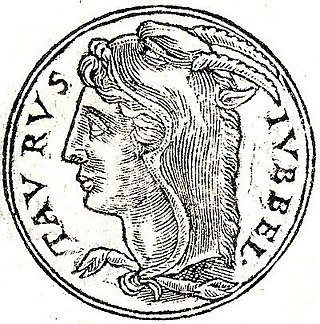Related Research Articles
Aulus Didius Gallus Fabricius Veiento was a Roman senator who played a major role in the courts of several Roman emperors during the first century AD. For his usefulness, Veiento was rewarded with the office of suffect consul three times in a period when three consulates were very rare for non-members of the Imperial family.
Lucius Marcius Philippus was a politician and senator in the late Roman republic. He was governor of Syria from 61 to 60 and later served in the consulship of 56 BC. He was also step-father of the emperor Augustus.
Gaius Ummidius Durmius Quadratus was a Roman senator of the Principate. He was the first member of the Ummidii to reach the office of consul in his family, or a homo novus. Quadratus is also known for his tenure as governor of Syria from c. 50 until his death.
Quintus Haterius was a Roman politician and orator born into a senatorial family.
Quintus Fabius Maximus was a general and politician of the late Roman Republic who became suffect consul in 45 BC.
Sextus Attius Suburanus Aemilianus, commonly abbreviated as Suburanus, was a Roman eques who helped Trajan consolidate his position as emperor. Originally procurator of Gallia Belgica, Suburanus was appointed prefect of the Roman imperial bodyguard, known as the Praetorian Guard, in the year 98 and brought this important military unit under Trajan's control. For his achievement, at the end of his command of the Guard, Suburanus was adlected into the Roman senate inter praetores, then held the suffect consulship as the colleague of the consul posterior Quintus Articuleius Paetus in AD 101.
Lucius Volusius Saturninus, also known as Lucius Volusius was a Roman Senator from the powerful plebeian Volusia gens, or family. He was a cousin of emperor Tiberius.
Quintus Junius Arulenus Rusticus was a Roman Senator and a friend and follower of Thrasea Paetus, and like him an ardent admirer of Stoic philosophy. Arulenus Rusticus attained a suffect consulship in the nundinium of September to December 92 with Gaius Julius Silanus as his colleague. He was one of a group of Stoics who opposed the perceived tyranny and autocratic tendencies of certain emperors, known today as the Stoic Opposition.

Titus Statilius Taurus was the name of a line of Roman senators. The first known and most important of these was a Roman general and two-time consul prominent during the Triumviral and Augustan periods. The other men who bore this name were his descendants.
Marcus Vinicius was a Roman senator and general, who held a number of posts in the service of the first Roman emperor, Augustus. Vinicius was suffect consul in the latter part of 19 BC with Quintus Lucretius Vespillo as his colleague.

Paullus Fabius Maximus was a Roman senator, active toward the end of the first century BC. He was consul in 11 BC as the colleague of Quintus Aelius Tubero, and a confidant of emperor Augustus.
Gaius Calvisius Sabinus was a consul of the Roman Republic in 39 BC under the Second Triumvirate. He and his consular colleague Lucius Marcius Censorinus had been the only two senators who tried to defend Julius Caesar when his assassins struck on 15 March 44 BC, and their consulship under the triumvirate is taken as a recognition of their loyalty. An inscription, described by Ronald Syme as "one of the most remarkable inscriptions ever set up in honour of a Roman senator," praises Calvisius for pietas, his sense of duty or devotion. As a military officer, Calvisius is notable for his long service and competence, though he was not without serious defeats.
Lucius Marcius Censorinus was a consul of the Roman Republic in 39 BC, during the Second Triumvirate. He and his colleague Gaius Calvisius Sabinus had been the only two senators who tried to defend Julius Caesar when he was assassinated on the Ides of March in 44 BC, and their consulship under the triumvirate was a recognition of their loyalty.
Gnaeus Pompeius (Rufus) (died AD 14) was suffect consul in 31 BC, during the transitional period when Octavian, the future Augustus, was consolidating his powers as princeps.
Lucius Caninius Gallus was a Roman senator who was appointed suffect consul in 2 BC.
Lucius Nonius Asprenas was a Roman Senator active during the Principate. He was notorious for being prosecuted for poisoning a number of people at a dinner party.
Gaius Caninius Rebilus was a Roman Senator, who was appointed suffect consul in 12 BC with Lucius Volusius Saturninus as his colleague.
Sextus Erucius Clarus was a Roman senator and aristocrat. He was Urban prefect and twice consul, the second time for the year AD 146. Clarus was the nephew of Gaius Septicius Clarus, a friend of Pliny the Younger.
Gaius Vibius Rufinus was a Roman senator, who flourished during the early first century. He was suffect consul as the colleague of Marcus Cocceius Nerva in August of a year during the first half of the first century; which year is still in dispute. Rufinus was an acquaintance of the poet Ovid, who addressed two of his poems to him from his exile in Tomis.